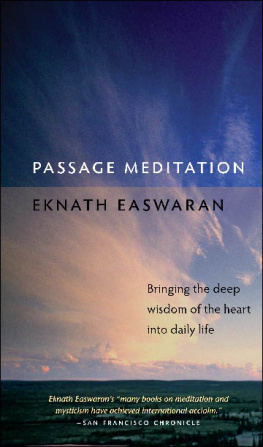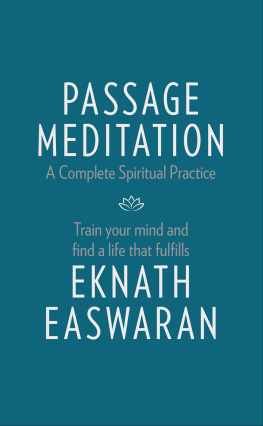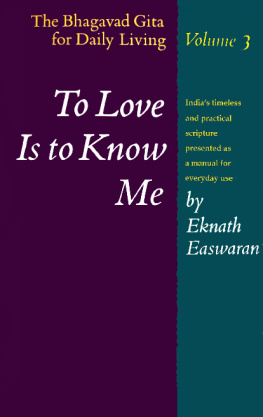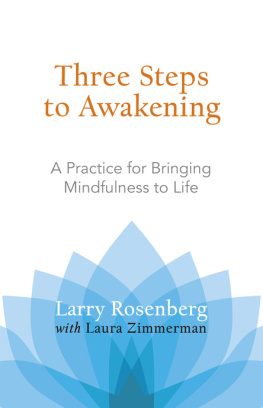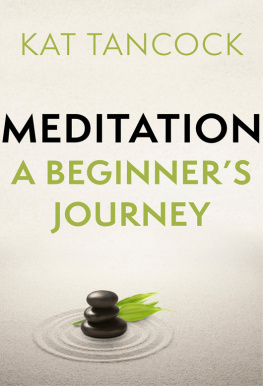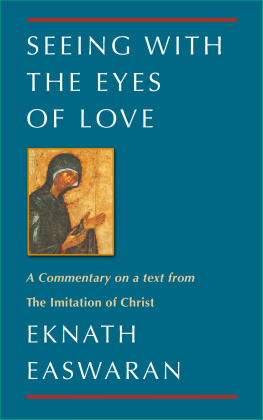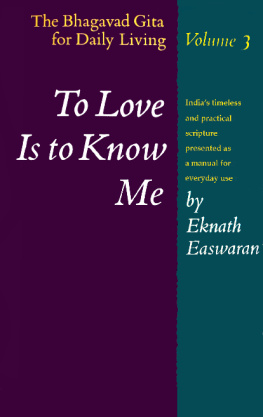Chapter 1
Meditation on a Passage
I am going to suppose that your purpose in picking up this book is to learn to meditate; so I will begin straight away with some instructions.
I recommend beginning with the Prayer of Saint Francis of Assisi. If you already know another passage, such as the Twenty-third Psalm, it will do nicely until you have learned this prayer. But over many years of teaching meditation, I have found that Saint Franciss words have an almost universal appeal. Through them pulses the spiritual wisdom this gentle friar drew upon when he undertook the most awesome task a human being is capable of the total transformation of character, conduct, and consciousness. The prayer goes like this:
Lord, make me an instrument of thy peace.
Where there is hatred, let me sow love;
Where there is injury, pardon;
Where there is doubt, faith;
Where there is despair, hope;
Where there is darkness, light;
Where there is sadness, joy.
O divine Master, grant that I may not so much seek
To be consoled as to console,
To be understood as to understand,
To be loved as to love;
For it is in giving that we receive;
It is in pardoning that we are pardoned;
It is in dying to self that we are born to eternal life.
I hope you will understand that the word Lord here does not refer to a white-bearded gentleman ruling from a throne somewhere between Neptune and Pluto. When I use words like Lord or God, I mean the very ground of existence, the most profound thing we can conceive of. This supreme reality is not something outside us, something separate from us. It is within, at the core of our being our real nature, nearer to us than our bodies, dearer to us than our lives.
If you prefer a passage from another tradition, here are some other popular choices I recommend:
The Whole World Is Your Own
I tell you one thing
if you want peace of mind,
do not find fault with others.
Rather learn to see your own faults.
Learn to make the whole world your own.
No one is a stranger, my child;
this whole world is your own.
Sri Sarada Devi
The Best
The best, like water,
Benefit all and do not compete.
They dwell in lowly spots that everyone else scorns.
Putting others before themselves,
They find themselves in the foremost place
And come very near to the Tao.
In their dwelling, they love the earth;
In their heart, they love what is deep;
In personal relationships, they love kindness;
In their words, they love truth.
In the world, they love peace.
In personal affairs, they love what is right.
In action, they love choosing the right time.
It is because they do not compete with others
That they are beyond the reproach of the world.
Lao Tzu
Let Nothing Upset You
Let nothing upset you;
Let nothing frighten you.
Everything is changing;
God alone is changeless.
Patience attains the goal.
Who has God lacks nothing;
God alone fills every need.
Teresa of Avila
Radiant Is the World Soul
Radiant is the world soul,
Full of splendor and beauty,
Full of life,
Of souls hidden,
Of treasures of the holy spirit,
Of fountains of strength,
Of greatness and beauty.
Proudly I ascend
Toward the heights of the world soul
That gives life to the universe.
How majestic the vision
Come, enjoy,
Come, find peace,
Embrace delight,
Taste and see that God is good.
Why spend your substance on what does not nourish
And your labor on what cannot satisfy?
Listen to me, and you will enjoy what is good,
And find delight in what is truly precious.
Abraham Isaac Kook
Having memorized the passage, be seated and softly close your eyes. We defeat the purpose of meditation if we look about, admiring the bird on the sill or watching people come and go. The eyes, ears, and other senses are rather like appliances with their cords plugged into the mind. During meditation, we try to pull out the plugs so we can concentrate more fully on the words of the passage. To disconnect the senses to leave the world of sound behind, for instance is difficult. We may even believe that it is not possible, that everything has been permanently installed. But the mystics testify that these cords can be disconnected and that when we do this, we experience a serenity beyond words.
So shut your eyes without getting tense about it. Since the body should be relaxed, not strained, there is no need to be effortful. The best teacher for eye-closing I have seen is a baby ... tired lids gently sliding down on tired eyes.
Pace
Once you have memorized a passage, you are ready to go through it word by word, as slowly as you can Why slowly? I think it is Meher Baba, a modern mystic of India, who explained:
A mind that is fast is sick.
A mind that is slow is sound.
A mind that is still is divine.
Think of a car tearing along at ninety miles per hour. The driver may feel exuberant, powerful, but a number of things can suddenly cause him to lose control. When he is moving at thirty miles per hour, his car handles easily; even if somebody else makes a dangerous maneuver, he can probably turn and avoid a collision. So too with the mind. When its desperate whirrings slow down, intentionality and good judgment appear, then love, and finally what the Bible calls the peace that passes understanding. Let the words, therefore, proceed slowly. You can cluster the small helper words with a word of substance, like this:
Lord... make... me... an instrument... of thy... peace.
The space between words is a matter for each person to work out individually. They should be comfortably spaced with a little elbowroom between. If the words come too close together, you will not be slowing down the mind:
Lord.make.me.
If the words stand too far apart, they will not be working together:
Lord make
Here make has put in its contribution, but me simply wont get on with it. Before long some other word or image or idea rushes in to fill the vacuum, and the passage has been lost.
With some experimentation, you will find your own best pace. I remember that when I learned to drive many years ago, my instructor kept trying patiently to teach me to use the clutch. I was not a terribly apt pupil. After a number of chugging stops and dying engines, I asked him how I was ever going to master those pedals. He said, You get a feeling for it. That is the way with the words too: you will know intuitively when not enough space lies between them and when there is too much.
Concentrate on one word at a time, and let the words slip one after another into your consciousness like pearls falling into a clear pond. Let them all drop inwards one at a time. Of course, we learn this skill gradually. For some time we drop a word and it floats on the surface, bumped around by distractions, irrelevant imagery, fantasies, worries, regrets, and negative emotions. At least we see just how far we are from being able to give the mind a simple order that it will carry out.
Later on, after assiduous practice, the words will fall inward; you will see them going in and hitting the very bottom. This takes time, though. Dont expect it to happen next week. Nothing really worth having comes quickly and easily; if it did, I doubt that we would ever grow.
As you attend to each word dropping singly, significantly, into your consciousness, you will realize that there is no discrepancy between sound and meaning. When you concentrate on the sound of each word, you will also be concentrating on the meaning of the passage. Sound and sense are one.

